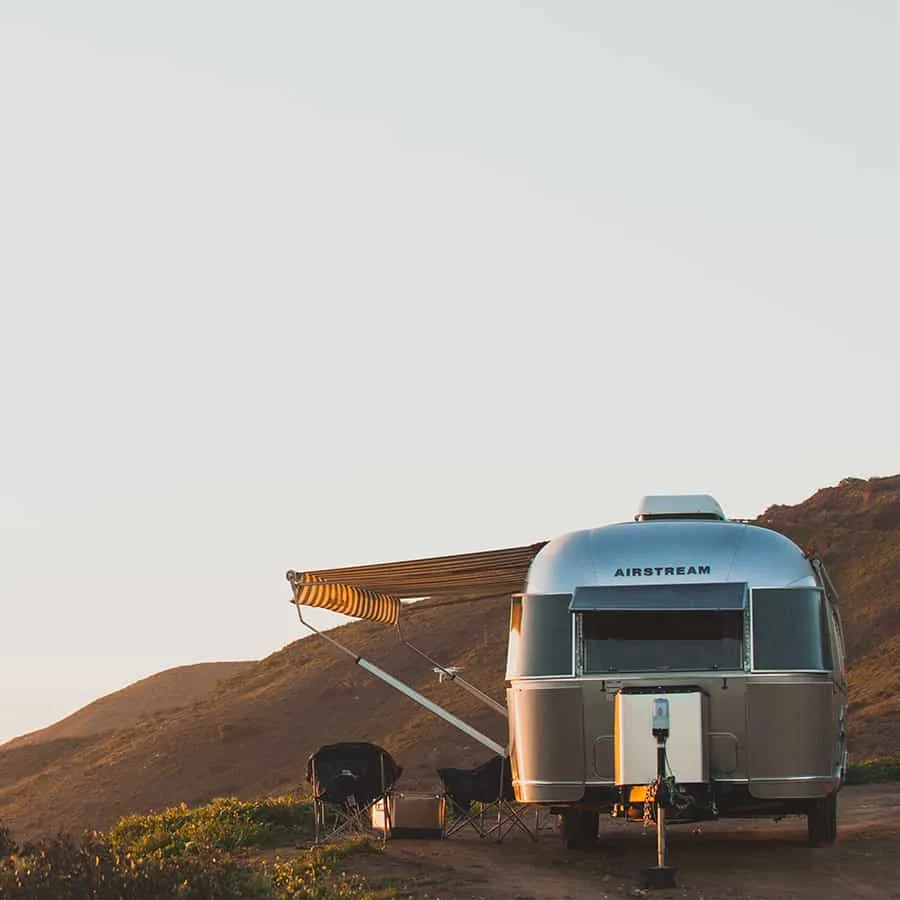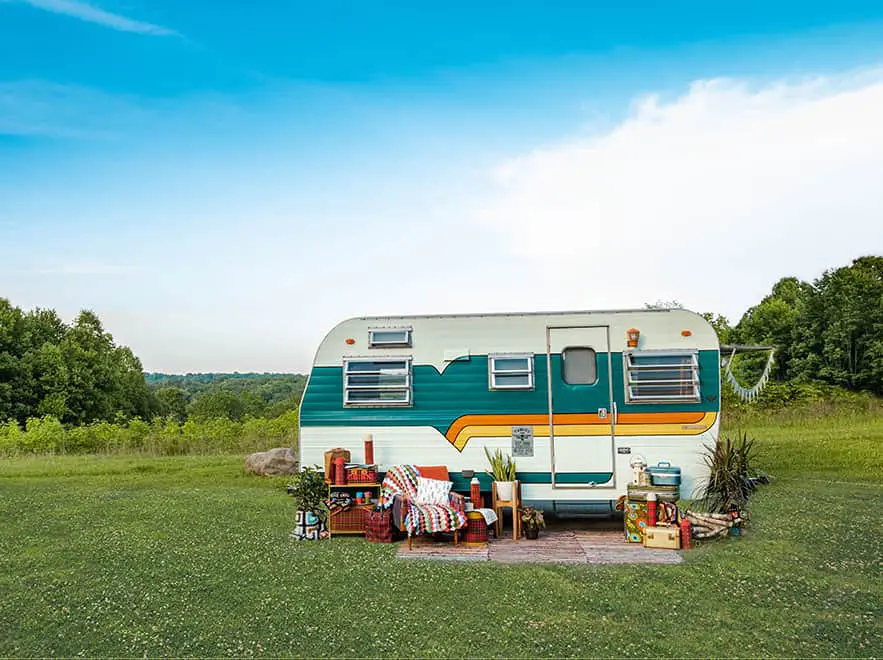“How much does that camper trailer weigh and could my vehicle tow it with ease?” Have you ever asked yourself that question? No worries, I got your back, here we will cover everything you should account when trying to estimate how much weight you can tow.

With the rise in sales of hatchbacks and compact electric cars, anyone looking to buy a camper could find themselves roadblocked when it comes to what their vehicle can handle weight-wise, and the camper or other RV of their dreams. And let’s face it, no one wants to be stuck with a camper their car can’t pull uphill.
If you are reading this to discover what are the best camper weights for your vehicle before buying that awesome trailer you’ve had your eye on, well done.
Campers can get super-heavy – especially once they are kitted out with an adequate water supply and all your gear. That said, we also have some helpful tips on how to reduce the weight inside your camper if you want to lighten the load as much as possible.
If the idea of buying a camper with the perfect weight to match your vehicle seems too much like hard work, you can skip the matching process entirely and get a van!

Camper Weight vs. Vehicle Size
A friend told me that one of their earliest memories was when the family loaded up the station wagon, hitched up their new camper, and headed for the mountains. They never got there, of course.
The station wagon engine overheated on the first incline they encountered, and they spent their vacation at a sea-level campsite instead!
It’s not the size of the vehicle so much when it comes to towing competently, but the engine power. Campers and trailers can push a car’s thermistor into the red very quickly if the weight to power ratio is off-kilter.
The problem with buying a camper online, or looking in display windows at your nearest strip mall, is that the suggested weight you see on the available information relating to the model doesn’t take onboard water, full gas tanks, and supplies into account.
That information is only available once you have bought the model and have access to the owner’s manual. That’s why it’s a really good idea to turn to the internet for some more info about the make and model’s weight before buying your camper.
This can make the difference between having to gear down on a hill or seeing your dashboard thermometer push over to the red.
What Do All the Load Capacity and Vehicle Weights Mean?
It’s important to know what all the acronyms and weight indications mean as they refer to the maximum load your vehicle can carry or tow. Knowing this is crucial to the efficient and safe operation of both camper and car (or truck).
Have no fear if the terms “mass” and “gross” are unfamiliar to you. The word mass can be interchanged with the word “weight,” and gross means an item’s entire weight.
If you still have your doubts about whether your car can haul your new camper uphill and down dale, take it to the nearest weighbridge or weigh station (nearest one to you can be found online, on the side of a highway, or at the local drivers licensing and testing department).
For a small fee, an accurate weight of your vehicle and camper can be determined before you set out on your journey, and save you many headaches!
Weight Terminology for Loaded Vehicles and Trailers
- Tare Mass/Weight: The weight of your vehicle as it stands empty. Includes fluids such as coolants and oils but with only 2.5 gallons / 10 liters of gas in the tank.
- Curb Mass/Weight: The same as Tare Mass/Weight, but includes a full gas tank. Excludes accessories fitted to the vehicle such as roof racks, bike racks, tow bars, and bull bars. This is the standard weight of a car or truck used for everyday transport.
- Gross Mass/Gross Vehicle Mass/GVM/Gross Vehicle Weight/GVW: Remembering that gross means total vehicle weight when it’s fully loaded, you will find your vehicle’s optimum gross weight in the owner’s manual or the sticker on the inside of the door opening on the driver’s side. Basically, it’s the Curb Mass plus all your accessories and extra load. GVM/GVW includes the towing download as well.
- Payload: Payloads are the maximum load (including towing) that your vehicle can carry. This is the specified recommendation by the manufacturer.
- Gross Vehicle Axle Weight/Mass: The maximum load your vehicle’s front axle and rear axle can bear according to the specified recommendation by the manufacturer. The exact weight can be found in the owner’s manual. Combined total axle weight (gross) exceeds the Gross Vehicle Mass because there is a safety margin. The most important feature of Gross Vehicle Axle Weight is to ensure it’s been evenly distributed across both axles.

Campers and Travel Trailers Weight Ratings Terminology
Tare Mass/Weight: The weight of an empty trailer or camper. Also called the Dry Weight. Here, the term “trailer” or “camper” signifies any attachment you can trail or tow with your vehicle. This includes a wide range of items, including:
- Single axle box trailers
- Camper travel trailers, such as teardrop campers
- Motorcycle and jet-ski trailers
- Heavy-duty, multi-axle boat trailers
- Caravans
- Fifth-wheels
- Horse or cattle trailers
Unlike a car or other vehicle, the Tare Mass/Weight of a travel trailer or camper doesn’t include fluids such as toilet systems, water tanks, and LPGs. This is why it’s also known as the trailer’s Dry Weight.
Average campers weigh approximately 5,200lbs / 2,350kgs as a Dry Weight. The average additional weight once loaded is 1,500lbs / 680kgs – this includes all your gear and water. If you know your destination has a useable water supply and you are traveling there along main roads, it will be safe to travel with a water supply that only lasts you for your road trip.
The general rule of thumb when it comes to trailer weights is for every one foot of trailer, around 250lbs of Payload weight can be calculated (not including the hitch).
Gross Vehicle Weight Rating/GVWR
The maximum axle load the manufacturers have specified your travel trailer or camper has been designed to carry. It includes the combined weight of whatever your camper or trailer is carrying (payload) and the trailer itself. Gross Trailer or Camper Weight limits can be found in the owner’s travel trailer manual, online specs, or displayed on the trailer itself. Gross Trailer Weight Ratings includes the absolute maximum towing weight for your camper or trailer as specified by the manufacturers and should never be exceeded.
How is GVWR Different from GVW?
The term “GVWR” is widely understood throughout the RV community. It stands for the maximum fully loaded travel trailer weight the vehicle can handle without endangering the tow vehicle’s structure or the inhibiting the safe operation of the car towing it. Any additional weight has been deemed detrimental by the manufacturers.
GVWR (Gross Vehicle Weight Rating) is different from GVW (Gross Vehicle Weight). GVW refers to a scale that is used to gauge the actual travel trailer weight when it’s carrying the full Payload.
- GVWR: The weight you should never exceed.
- GVW (also called Gross Trailer Weight/GTW): The travel trailer weight with its maximum payload.
For example, if your travel trailer has a Dry Weight of 6,000lbs and the GVWR is listed as 8,000lbs, this means you cannot exceed the additional weight of 2,000lbs without endangering the structure of the travel trailer and the safety of the tow vehicle. Each GVWR is calculated specifically for each vehicle.
The testers take every permutation of structural integrity and travel safety into account in order to gauge the correct collective maximum weights. This means that even if your car can handle an overweight travel trailer if the GVWR has been exceeded, you can never take it out on the road without risk.
The risk of exceeding your weight limit
- The transmission on your tow vehicle will be considerably shortened.
- The engine can dangerously overheat
- Front tire traction is compromised
- Steering difficulties
- Chance of tipping over is greatly increased
- Damaging the tow vehicle, towed vehicle, and tow bar
- Suspension straining and breaking
- Tire blowout
- Brakes failing
- Brakes inadequate for stopping, slowing down, or traveling downhill
- Jackknifing
When you follow the GVWR guidelines, you increase the longevity of your vehicle and trailer, not to mention keeping your own life safe! With this in mind, if your car or truck has a GVW of 7,500lbs, you should only be looking at travel trailers and campers with a GVWR of 7,500lbs. It’s required by federal law to have the GVWR of every vehicle listed, so look for it in the specs, owner’s manual, or on the VIN number.

How Camper Construction Affects Its Weight
Travel trailers and campers can be constructed out of fiberglass with aluminum exterior sidings. These are extremely lightweight when compared to other materials.
Then there are stick-built trailers. They usually have exterior aluminum covering a wooden frame.
Airstream trailers and campers are instantly recognizable by their iconic shape and metallic coloring. They are built according to the latest lightweight technology and therefore, easy to tow and light on gas.
What Weights Should You Watch Out For When Loading Your Trailer or Camper?
Water weighs around an incredible 8lbs per gallon! You need to find out how much water your camper or travel trailer tanks hold and then multiply that by 8.3 – that’s how much your full water tank will weigh.
A large camper water tank will take up about 350lbs to 500lbs of your total weight allowance. Clean water is a necessity during travel and camping, so don’t scrimp on this weight obligation, especially if you’re heading out into unchartered areas.
As you stock up your cupboards with all those handy packets and cans of goodies, don’t forget to do so with a calculator. As you place the food item onto the shelf, add its weight onto the calculator and only hit the equal symbol when all your food has been packed.
Ask everyone who’s accompanying you in the tow vehicle to step on the scales and calculate this weight into the GVWR as well. If you don’t have a scale, drive your companions or family to the nearest weigh station and weigh the tow vehicle with everyone inside it. Also add their fully packed tote bags, backpacks, or suitcases together and find out how much their gear weighs. Clothing, shoes, and ablution aids can add up to be quite heavy, especially during winter.
Next up, weigh all of the cooking utensils, dishes, tech gear, bedding, and any other extra cargo. If you bought your travel trailer already fully kitted out with a lot of this stuff, find out how much it weighed at purchase and this will save you having to weigh each individual item.

How to Equip Your Travel Trailer, Camper, or RV to Haul Less Weight
If all this worrying about weight has gotten you thinking about how to haul less weight around, then you’ll be happy to know that many other folks have discovered some great ways to do it.
It doesn’t matter how you use your RV, travel trailer, or camper:
- Full-time traveling and living
- Packing for an extended road trip
- A quick weekend getaway
Cutting back on rig weight will not only give you peace of mind knowing you have some leeway if you want to add weight throughout your travels, but also save your gas consumption. The aim is to drop weight without necessitating you having to cut back on essential gear.
Window Treatments
Sure, you need something over the window in your travel trailer because blocking out the sun doesn’t just make sitting inside more comfortable, but saves the interior from fading as well. However, you don’t need bulky, heavy window treatments in order to do this.
You can replace them with cool, light fabric shades or blinds. When they are rolled up, they are tucked neatly away and aren’t left flapping in any breezes or collecting dust.
Toilets
Liquids weigh a lot. Many black tank camper toilets carry around a hefty volume of chemicals inside them. If you replace a chemical black tank toilet with a compost toilet, you will save on all the additional water and chemical weight a black tank toilet requires for use.
Compost toilets are dry and use a variety of lighter materials to aid the decomposition of any organic matter. One of these materials is coconut husk coir which absorbs and holds organic matter while still remaining lighter in comparison to water. If the idea of a compost toilet doesn’t appeal to you, you’ll be pleased to know that basic portable toilets are also lighter than black tank chemical toilets.
Shelving, Cabinets, Drawers
While we’re on the subject of lightweight materials, you might want to think about removing all the heavy and unnecessary shelves, cabinets, and drawers in your camper. By replacing them with wicker baskets and plastic trays or bins, you will also be removing a huge chunk of weight off and out of your travel trailer.
If you’re not that keen to change any of the built-in designs the manufacturers installed, check that there is no additional weight in the shelving itself. Wood does look lovely, but it weighs a ton and can easily be replaced by a lighter material such as melamine. Also, think about swapping out wooden installations like dining tables and storage chests for lightweight aluminum ones.
Swap out heavy mattresses for foam ones. Change china crockery and cutlery for reusable plastic or enamelware, and remove all unnecessary accessories. Don’t be too draconian when it comes to clearing out your camper though. If you love your glass salt and pepper shakers or can’t imagine your life without your brand name spatula, leave them in!
Sliding Doors
The sliding doors and partitions in campers and the larger size travel trailers are often never used, especially when they are in places that can just as easily have curtains there, such as clothing closets. A shower curtain does the job of providing privacy just as well and weighs much less than glass or wood.
Hot Water Storage Bypass Valve
Even when you camp off the grid, you probably won’t want to use your propane or power to heat your water, especially in summer. So, why carry the extra stored water? By adding a bypass valve to the hot water heating system, it allows you to shut that part of the water system off and drain out the water stored there. This will lose you a hefty 7 gallons of water weight. Even when the bypass valve is in place, you can still use the water in your tank via the cold water faucet.
Finally, Remove Anything You Haven’t Ever Used
Has your camper or RV got an exterior ladder or canopy extension that you have never used or had plans to use in the future? Then get rid of it, and anything else superfluous that’s inside or on the outside of your travel trailer.
Only use your camper during spring or fall? Get rid of the AC. Does your trailer have a massive spare tire attached? If you travel only along main roads, then dump that too. AAA will help you out for flat tire emergencies you may encounter on the roads.

Conclusion
Remember to hang onto any of the items you take out or replace for when the time comes for resale. If anything needs to be fixed or replaced during your ownership, do it with aluminum. This includes bed frames, curtain rods, and towel racks.
Calculating the weight of your camper or travel trailer is simple to do and makes it so much more reassuring when you hit the road.

